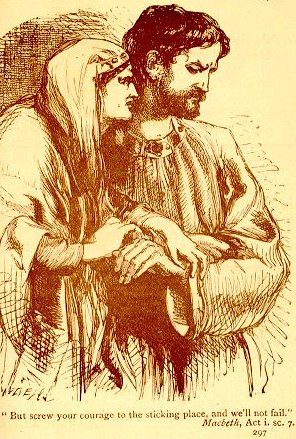Simple Gifts
Today, a treat. I have a guest commentator. Seattle Actor Megan Cole is here to talk about complexity, simplicity, and Shakespeare. The University of Houston presents this series about the machines that make our civilization run, and the people whose ingenuity created them.
I've been thinking lately about how some things that seem simple can turn out to be considerably more complex. Like, say, learning to whistle. Or making an omelet that doesn't end up as scrambled eggs. Or conducting a long-term friendship.
The craft of theatre can be like that, too. After all these years of trying to make sense of its seductive complexities, I sometimes find that it's the simple things that offer the straightest path to the heart of the matter. And the heart of the matter is usually simple human truth.
Take, for example, this line from Shakespeare's Macbeth (and saying Macbeth's name in a theatre is, of course, superstitiously forbidden, so I'm being very brave to use it here on radio). The line is spoken by Lady Macbeth, who is plotting with her husband to murder King Duncan. Macbeth has just said, "If we should fail?" and she replies with two words -- "We fail" -- and then goes on to talk about screwing their courage to the sticking point.
Well, this seems simple enough. But in fact it's not. How we say these words makes all the difference. And it further depends on what edition of the text we use, on whether the editor chose to use a period, a question mark, or an exclamation point.
Here: let's say our editor has decided that a period is what's needed. We fail, period. Let me just try a couple of end-stop readings:
"We fail." That's -- what? -- indignant. Or:
"We fail." Sarcastic. Or:
"We fail." Ah, the pragmatist.
But let's say our editor has chosen a question mark instead of a period. Now what have we got? Well, maybe:
Cavalier: "We fail?"
Threatening: "We fail?"
Shocked: "We fail?"
Thoughtful: "We fail?"
Or suppose there's an exclamation point: "We fail!" Suddenly she's the brazen daredevil.
 And so on. The point is: Here, within two "simple" one-syllable words on a page, we find lurking at least eight possible readings. And of course each reading expresses a completely different personality, and a completely different relationship between the Macbeths. And that thickens the brew even more.
And so on. The point is: Here, within two "simple" one-syllable words on a page, we find lurking at least eight possible readings. And of course each reading expresses a completely different personality, and a completely different relationship between the Macbeths. And that thickens the brew even more.
Suppose Macbeth says fearfully, "If we should fail?" Do we really want his partner in crime to be equally uncertain -- "We fail?" -- or do we want her to be a powerhouse who dominates this milquetoast with a contemptuous "We fail!"
Here's something else: suppose we change the emphasis: "We fail?" -- as in, "This is your gig, buster, and don't you forget it."
So, you see what I mean. As Stephen Sondheim said, "What's hard is simple; the natural comes hard." I guess sometimes things are just not what they seem to be. The mind reels. The mind rejoices. I think I'll go make that omelet, or call a friend.
I'm Megan Cole, and in the theatre we give a great deal of attention to the way inventive minds work.
(Theme music)
Megan Cole is a noted stage and TV actor and regular visiting faculty member at the University of Texas Medical Center in Houston. She originated the role of Dr. Vivian Bearing in the Pulitzer-Prize-winning play Wit. She has also played recurring characters on Seinfeld, ER, Star Trek, and other popular shows.